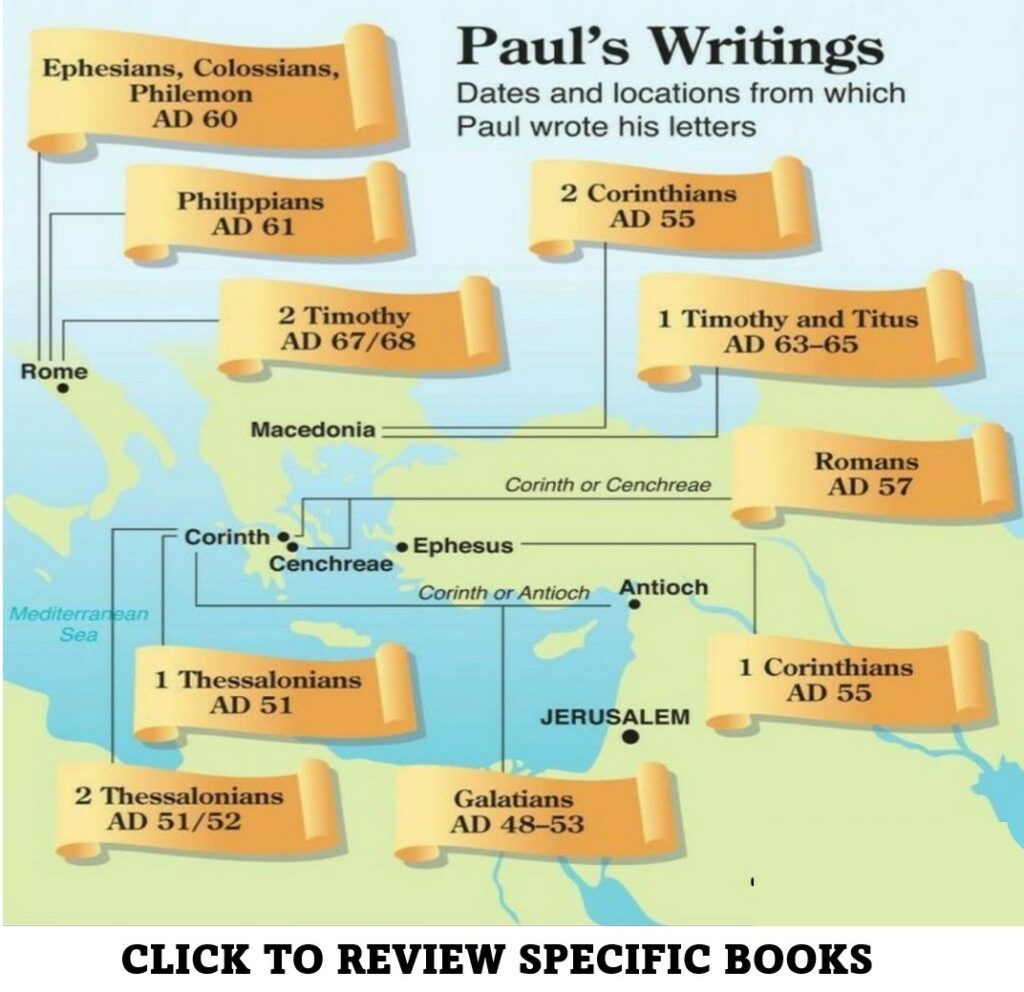Writings By or About Paul the Apostle

Paul the Apostle left a profound literary legacy that provides the foundation of much Christian theology. His writings, composed as letters to various churches and individuals, offer unique insights into his dynamic faith, the challenges of the early Church, and the transformative power of the Gospel. While some texts are definitively attributed to Paul, others incite scholarly debate surrounding their authorship (pseudepigrapha). Whether written directly by Paul or by others in his tradition, these texts profoundly shape how Christianity is understood and practiced. Like many early church figures, later authors wrote stories of his life and teaching – Apocrypha – that are non-canonical and likely fictious.
Paul’s writings tackle a broad range of subjects reflecting the complexities of early Christianity. His primary focus centers on the Gospel message, expounding upon the life, death, and resurrection of Jesus Christ as the path to salvation. He also delves into theological concepts like justification by faith, the role of the law, and the nature of the Church as the body of Christ. His writings frequently address specific issues within the churches he founded, mediating conflicts, correcting misunderstandings, and strengthening believers amidst persecution. Ultimately, Paul’s writings seek to establish, instruct, and encourage Christian communities across the Roman world, shaping their understanding of the faith and its implications for daily life.
Paul’s letters found in the New Testament include Romans, Corinthians, Galatians, Ephesians, Philippians, Colossians, Thessalonians, Timothy, Titus, and Philemon. His letters are occasional, written in response to real situations rather than as the vehicle for systematic theology. Nevertheless, they are official: They are not written for personal news or entertainment but as a message from an apostle to the “church of God” to his delegates in a certain place. His letters are complex in composition, using community traditions and often written with the help of secretaries and co-sponsors. Finally, his letters are unique: Although they share certain formal features, they differ in length, style, and rhetorical type. His communications were respected and treasured, quickly collected and used by early Christian teachers of impeccable orthodoxy, such as Polycarp of Smyrna and Ignatius of Antioch.
Paul's Acknowledged Authorship
Paul’s letters, written 50–68 A.D., provide the earliest extant interpretation of Jesus and of the movement connected to the name of Jesus. Paul dominates the New Testament canon: His adventures form the climax of the Acts of the Apostles, and his 13 letters are the core of the collection that became the New Testament.
Paul’s writings tackle a broad range of subjects reflecting the complexities of early Christianity. His primary focus centers on the Gospel message, expounding upon the life, death, and resurrection of Jesus Christ as the path to salvation. He also delves into theological concepts like justification by faith, the role of the law, and the nature of the Church as the body of Christ. Alongside these theological explorations, Paul offers practical guidance on Christian ethics, urging believers to live lives characterized by love, unity, and moral conduct.
Biblical scholars generally agree that seven letters – Romans, Galatians, Philemon, Philippians, 1 and 2 Corinthians, and 1 Thessalonians – were written or dictated by Paul in his lifetime. Three of them have some claim to authenticity (2 Thessalonians, Colossians, Ephesians) while three of them are considered pseudonymous (1 Timothy, 2 Timothy, Titus). At least four -Philemon, Colossians, Ephesians, Philippians – are believed to have been written while he was in prison.
Apocryphal (Non-Canonical) Texts
Several apocryphal or non-canonical texts discuss Paul the Apostle, although these texts are not considered part of the canonical New Testament. Some of these texts provide additional insights into Paul’s life, teachings, and encounters beyond what is found in the New Testament. Here are a few examples:
- Acts of Paul and Thecla: This text is an early Christian writing that focuses on the ministry of Paul and the story of Thecla, a young woman who becomes a follower of Paul. It includes accounts of Paul’s travels, miracles, and teachings. The Acts of Paul and Thecla emphasizes themes of celibacy, martyrdom, and the power of faith.
- Epistle of the Apostles: Also known as the Letter of the Apostles, this apocryphal text contains a series of teachings and instructions purportedly delivered by Jesus to his apostles, including Paul. It includes exhortations on various moral and doctrinal issues and provides insights into the early Christian community’s beliefs and practices.
- 3 Corinthians: Although titled as a letter from Paul to the Corinthians, 3 Corinthians is considered apocryphal and not included in the New Testament canon. It is attributed to Paul but is likely a later composition. The text contains themes related to Paul’s sufferings, visions, and teachings on spiritual warfare.
- The Acts of Paul: Similar to the Acts of Paul and Thecla, this text focuses on the missionary activities of Paul. It includes accounts of Paul’s travels, encounters with adversaries, and miracles performed during his ministry. The Acts of Paul provides additional narratives not found in the canonical Acts of the Apostles.
- The Apocalypse of Paul: This apocalyptic text purportedly contains visions and revelations given to Paul concerning heavenly mysteries, eschatological events, and the fate of souls after death. The Apocalypse of Paul presents a vivid portrayal of the afterlife and spiritual warfare.
Pseudo authors wrote in Paul’s name for several reasons, primarily to gain authority and legitimacy for their own teachings or beliefs within the early Christian community. Writing in Paul’s name allowed these authors to address contemporary issues or theological concerns under the guise of a respected figure from the past. This strategy provided a sense of continuity with established Christian teachings while introducing new interpretations or perspectives. Others may have written in his name as a form of homage or tribute, rather than outright deception. In some cases, the intention may have been to honor Paul’s memory by continuing his legacy through new writings attributed to him.
It’s important to note that while these apocryphal texts may contain elements of historical tradition, they are not considered authoritative by mainstream Christianity and are not included in the canonical New Testament.

